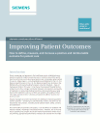 Due to increasing cost pressure in the healthcare sector, established remuneration models for healthcare services are in transition around the world. Fees for performance and value-based systems are increasingly replacing fees for service. Major players - including Medicare and Medicaid in the U.S., the National Health Service in the U.K., the National Health Care Institute in the Netherlands, and several leading European university hospitals - have all made great strides in this area. In Germany, the proposed Hospital Restructuring Act aims for a stronger correlation between remuneration and quality of treatment. In newly industrialized countries, where patients pay a large share of the treatment costs out of their own pockets, the quality of treatment plays a decisive role in choosing a hospital (in addition to price and access to care).
Due to increasing cost pressure in the healthcare sector, established remuneration models for healthcare services are in transition around the world. Fees for performance and value-based systems are increasingly replacing fees for service. Major players - including Medicare and Medicaid in the U.S., the National Health Service in the U.K., the National Health Care Institute in the Netherlands, and several leading European university hospitals - have all made great strides in this area. In Germany, the proposed Hospital Restructuring Act aims for a stronger correlation between remuneration and quality of treatment. In newly industrialized countries, where patients pay a large share of the treatment costs out of their own pockets, the quality of treatment plays a decisive role in choosing a hospital (in addition to price and access to care).
Hospital managers around the world face the challenge of improving patients' overall outcomes - and doing so cost effectively. Further, outcomes can be impacted by many factors, including overall patient health, safety, comfort, and satisfaction.
Download: Improving Patient Outcomes (.pdf, 312 KB).
Download from eHealthNews.eu: Improving Patient Outcomes (.pdf, 312 KB).
For further information, please visit:
http://www.siemens.com/healthcare-executive-alliance